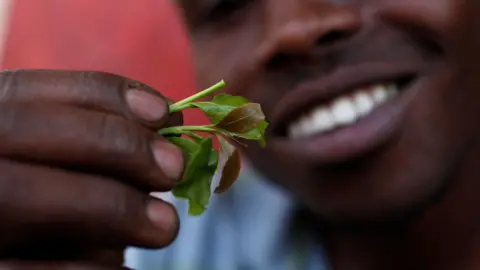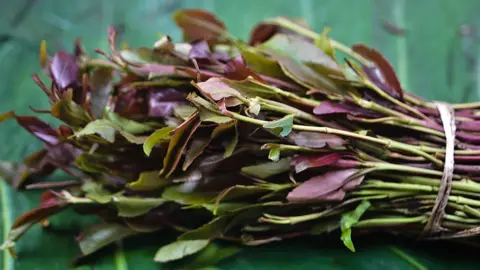Banned and 'forgotten' drug: What happened to khat?
 Getty Images
Getty ImagesA decade ago, a stimulative drug that sold for just a few pounds, was banned in the UK. Known as khat, it’s a plant that’s chewed, giving similar effects to amphetamine.
Ten years on from the drugs reclassification, experts say it is still being sold in the UK, in places for ten times more than it cost in 2014.
But there is little data to help understand the true impact of the ban.
Dr Neil Carrier, who carried out postdoctoral research on the drug at the University of Oxford, said it has largely been “forgotten” by authorities and “in terms of understanding drug policy, the bans' impact should really be researched”.
 Getty Images
Getty ImagesMohammed, not his real name, 25, told the BBC that he tried khat in 2018, four years after the ban.
He said: "The thing is, there's actually quite a lot of it readily available in the UK.
"You can get it in little silver sachet bags that are air-sealed and marketed as herbal facial products, but it's literally just khat."
He chewed the drug in a dried form, which has become more common during the past 10 years.
Dr Carrier, who currently works as a social anthropology professor at the University of Bristol, said fresh khat leaves were sold for “around £3 a bundle (250g)" during the 2000s and 2010s.
It was often chewed by Somali, Yemeni and Ethiopian men in group sessions at designated khat cafes, called mafrishes.
He helped produce a government-published literature review around khat’s social harms and legislation in 2011: “Very often as anthropologists, when we think about drugs, we don’t just focus on the drug itself but also how it gets caught up in the wider cultural meanings, wider relationships and power.
“We look at how it becomes a commodity and how the substance fits into society.”
He felt that the ban was a “missed opportunity” to investigate alternative methods of regulating recreational drugs.
“We could see how khat was associated with various issues that were very challenging with communities using khat in the UK.
"But at the time I felt the drug was blamed for these wider issues," he said.
In the early 2000s Dr Carrier said he often heard people attribute khat to family and social integration problems.
“I would hear things like ’men are not being good fathers as they chewed khat'.
“And 'people who are chewing khat might, as a consequence, not be looking for work'.
“But in reality, this is only half the picture.
“We often in society give drugs so much power and label them as the cause of problems when really the picture tends to be more blurred and complicated.”
 Getty Images
Getty ImagesLast year Border Force seized 2,760 hauls of class C drugs.
A Home Office spokesperson said: "Border Force and police work relentlessly to stop illegal drugs from coming into the country and keep them off our streets.
"We have seen a record level of seizures as we continue to use advanced technology, data and greater intelligence to ensure these drugs do not enter the country."
The UK was one of the last EU countries to reclassify the khat in June 2014.
Prior to this date, more than 2,500 tonnes was annually imported, according to the Advisory Council of the Misuse of Drugs (ACMD).
That is the equivalent weight of around 208 double-decker buses worth of the stimulative drug.
Most of the shipments are thought to have been distributed and sold amongst east-African diaspora communities in Britain, such as Somalis and Ethiopians.
Dr Carrier said khat and cannabis, both plant-based drugs, have a similar policing system which could have contributed to a lack of data on how prevalent less drugs like khat may be.
“A lot of the drugs data gets conflated with data around cannabis and they tend to get pooled together.
“As far as I understand anyways," he said.
UK Border Force tend to place khat into an "other class " category, when reporting the drug.
Dr Carrier added: “What people suspected would happen at the time of the ban has happened.
“Khat is now being smuggled in, especially a dried khat, mostly coming in from Ethiopia, and it seems to have become quite popular.
“The people that do still want to consume, even though it’s been banned, can still consume it in a different form.”
Dried khat is less potent than the fresh plant and is said to provide a “less pleasant user experience” in terms of taste and texture.
Dr Carrier said that meant there is still a market for the drug: “Some people, if they can afford it, will still chew the fresh stuff.
“The fresh stuff is £30 to £40 a bundle.
“But there are people still willing to spend that kind of money on it.
“People are still accessing khat.”
You can follow BBC Oxfordshire on Facebook, X, or Instagram.
